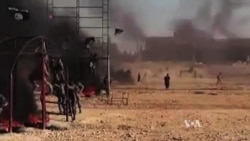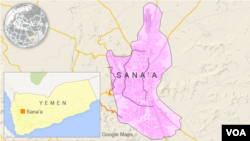White House Press Secretary Josh Earnest said Friday he could not corroborate Islamic State’s claims it was responsible for a blast at a Shi’ite mosque in the eastern Saudi Arabian governate of Qatif that killed at least 21 people.
“We obviously mourn the loss of life and condemn this violence," said Earnest. "The attribution, the determination about who is responsible, is still under review.”
A group describing itself as a newly-established IS affiliate claimed responsibility for the attack in Saudi Arabia. That attack and one at a mosque in the Yemeni capital Sana'a that wounded 13 Friday added to the growing number of casualties outside Islamic State's usual geographic targets in Syria and Iraq.
No change in US strategy
The attacks came on the heels of the Islamic State’s seizure of Ramadi, the capital of Iraq’s Anbar province, where some 1,300 U.S. service members were killed during the Iraq war. In neighboring Syria, the ancient city of Palmyra fell to IS militants Thursday.
Despite the loss of territory, the White House stood firm, announcing no changes in its strategy against the militant group, which consists of thousands of U.S.-led coalition airstrikes to back Iraqi forces on the ground.
“The president has clearly ruled out the use of U.S. military personnel in a ground combat role in Iraq," Earnest said. "And the reason for that is that we have an important lesson to learn from the previous invasion of Iraq.”
Earnest said President Barack Obama has been candid that the fight against the Islamic State will require a long-term, sustained commitment.
As for the goal of degrading the militant group, the White House spokesman said despite setbacks, based on the progress seen so far, the Islamic State will sustain additional losses in the next few years.
US strategy = 'no strategy'
Speaking at the World Economic Forum in Jordan Friday, Iraq's Vice President Ayad Allawi was critical of the U.S. air campaign, portraying it as "failed" in terms of controlling the spread of the Islamic State.
"There are no good news from the international coalition, and there is no strategy, so I asked the Iraqi leaders to put a strategy together and to present it to the coalition." Allawi told reporters at Forum. "The international coalition meets but without any results, the airstrikes do not solve the problem."
Coalition forces conducted five airstrikes in Syria from Thursday to Friday; another 15 coalition bombings in Iraq focused on the IS stronghold of Mosul and the newly-captured city of Ramadi.
A spokesman for the Popular Mobilization units, the paramilitary group allied with Iraqi government troops, told AFP that a counter-offensive to retake the city will happen "in the coming days" with what he said would be "tens of thousands" of fighters.
Islamic State made further inroads toward its goal of creating a transnational caliphate on Friday, seizing the last border crossing between Syria and Iraq that was held by the Damascus government, according to the Britain-based monitoring group Syrian Observatory for Human Rights [SOHR].
The SOHR says the Syrian government now controls less than half the country.







